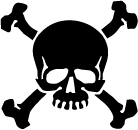 I almost titled this post, “Wut?”, but decided against it. It was, however, my initial reaction to this ArsTechnica story, Feeling guilt over P2P use? Piracy Payback wants to help. From the article:
I almost titled this post, “Wut?”, but decided against it. It was, however, my initial reaction to this ArsTechnica story, Feeling guilt over P2P use? Piracy Payback wants to help. From the article:
Feeling a sense of remorse, contrition, guilt, shame, and self-loathing over all that unauthorized peer-to-peer downloading you’ve been doing? Salve that stinging conscience by giving some cash back to artists!
That’s the pitch behind Piracy Payback, a website that collects donations from downloaders and distributes them to rightsholder organizations in Europe and North America (where much of the content originates).
The basic idea seems to be: if you download, and then you feel guilty, you can give some money to the artists you’ve “stolen” from by giving money to Piracy Payback, which will cheerfully pass it along to the artists. Except the basic idea is not the one that has been implemented. Piracy Payback does not give money to artists. It gives money to “rightsholder organizations.” This is not, in any way, the same. Will this money in any way filter through to the artist you “stole” from? Not likely. Why not? Because you don’t, you can’t, tell them which artist you stole from (just the medium you stole from, if you want to list it, choosing from music, film, television, software, gaming, or all of the above). We’re not even sure which rightsholders organizations cooperate with the site. Any “trickling down” of revenue to the relevant artist or creator would have to be happenstance (artists might as well play the lottery). What you’re really doing is giving money to the organizations that might later sue you for copyright infringement. Just melts that guilt away, doesn’t it?
Why would anyone do this? Let’s look at one possible reason after the jump.
Does making the payment insulate you in any way from litigation or liability for your actions (assuming any might exist)? No, and the site’s FAQ says as much:
9. Does making a Payback exempt me from piracy-related litigation?
No. The PiracyPayback.org service is designed to assist grassroots stakeholders detrimentally affected by digital piracy. It does not act as direct restitution to any immediately aggrieved party.
Could making a payment get you in trouble? Let’s read FAQ question 8:
8. Does making a Payback expose me to piracy-related litigation?
No. Our users range from concerned citizens right through to hardened practitioners. Your Payback will not define where you belong on this spectrum.
Again, wut? “Hardened practitioners”? “Concerned citizens”? I don’t even know what that means, to be honest. The site’s answer is “no” but no discernible reason is given. The “no” must follow because of course no one in the industry would ever think of suing Piracy Payback to get the names of people who have essentially admitted violating copyright law. No, never.
So where does the site expect to get its donors? It classifies downloaders and then divides them up into categories:
- Non-pirates (don’t do it)
- Innocents (do it, but don’t know it’s wrong; small group)
- Pragmatists (do it sometimes, but only to access material they can’t otherwise, to avoid DRM, etc.)
- Seekers (seek out material to add to their collection; the largest segment)
- Blackbeards (do it with a peg leg on; “they are looking to not only access pirated material but also distribute it” For them, piracy is a badge of honor. While possibly paying lip-service to the ‘evil media empire,’ they are unlikely to settle for any business model that is not free.”)
The site is “reaching out” to the pragmatists and seekers, as these are the ones who can apparently be “rehabilitated” and with the site’s help, they can take their first step toward legitimacy and restful, sleep-filled nights. And the site just makes a little money helps by “coax[ing] them toward the light.” What’s the harm in that, right?
In case you can’t tell, I think this is a really silly idea. I have trouble believing anyone (yes, anyone) would do it. The article notes that “interest from the public has not been especially high.” Well, that I understand.
If you’re downloading and feel that what you are doing is illegal, the first step is to stop it. Then, find a way to help the artist or creator yourself, not through a site that takes 12% of your payment for itself. The slice off the top makes me wonder if this site is any better than the downloaders; it itself benefits monetarily from allegedly illegal downloads. You could argue that it encourages people to download by helping them feel “better” after they’ve done it. The more “unauthorized” downloaders there are, the more there are who might pay through this site, bringing (perhaps some) profit to the site.
Guilt isn’t easy, and if you’ve got it, then it’s not going to go away just because you throw a few dollars to Piracy Payback.